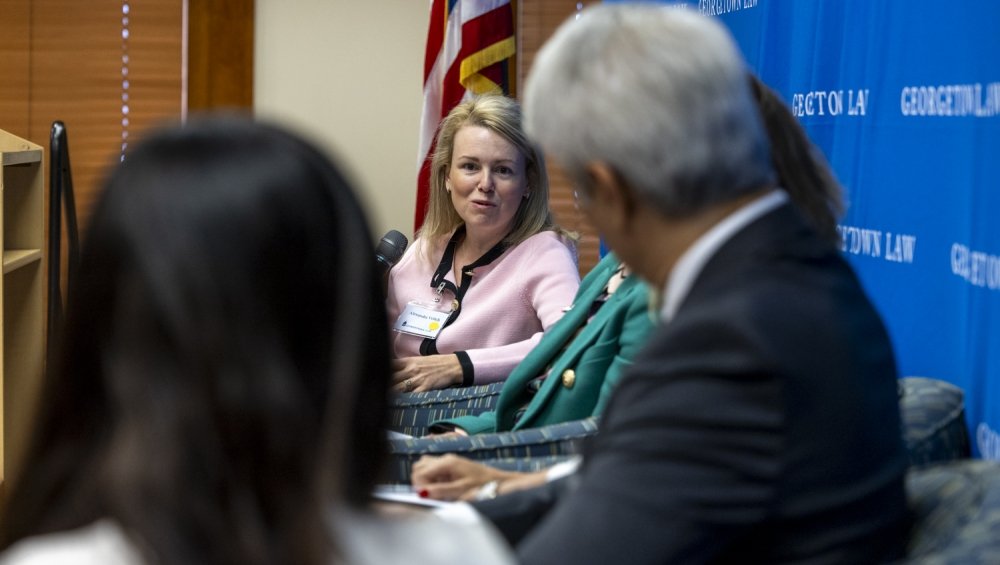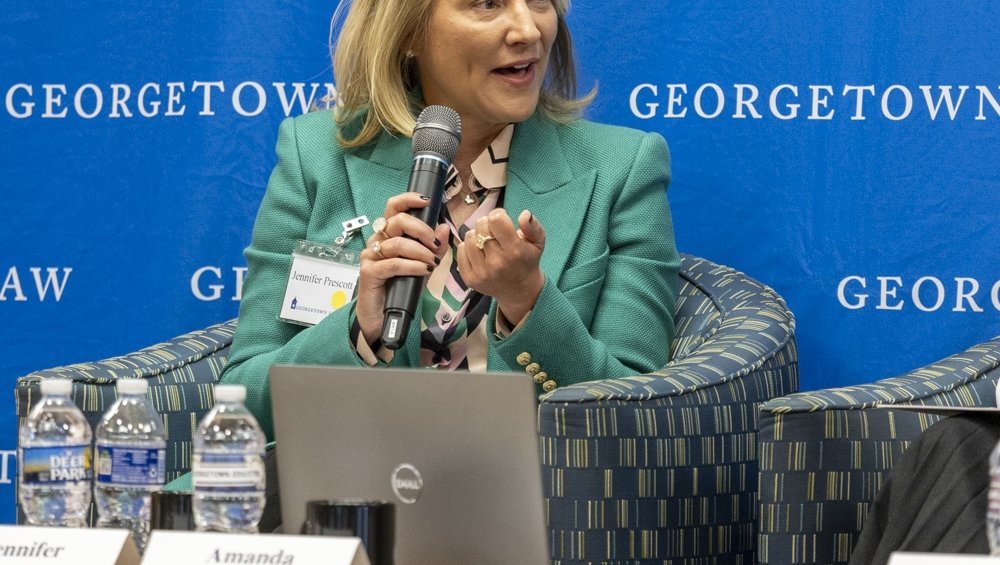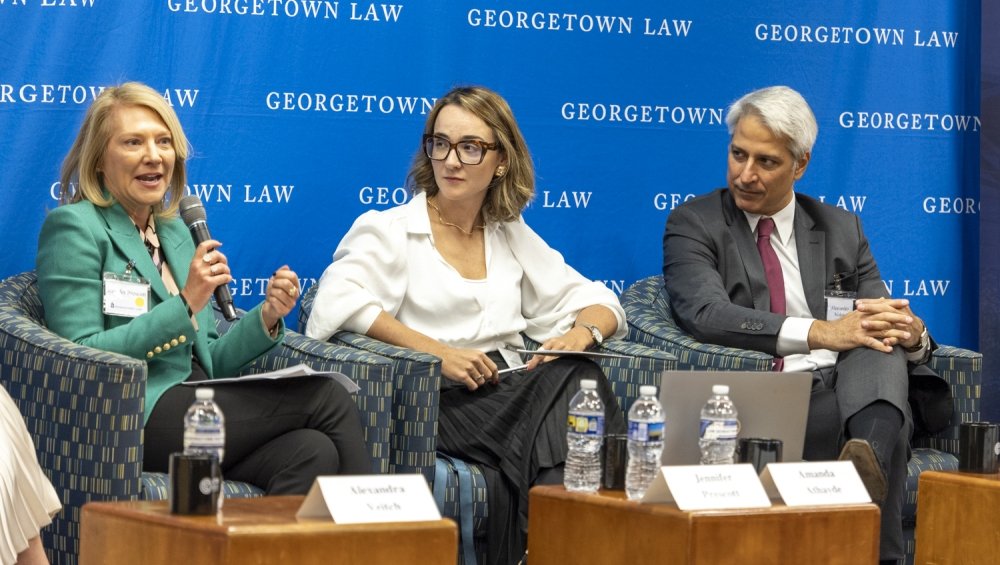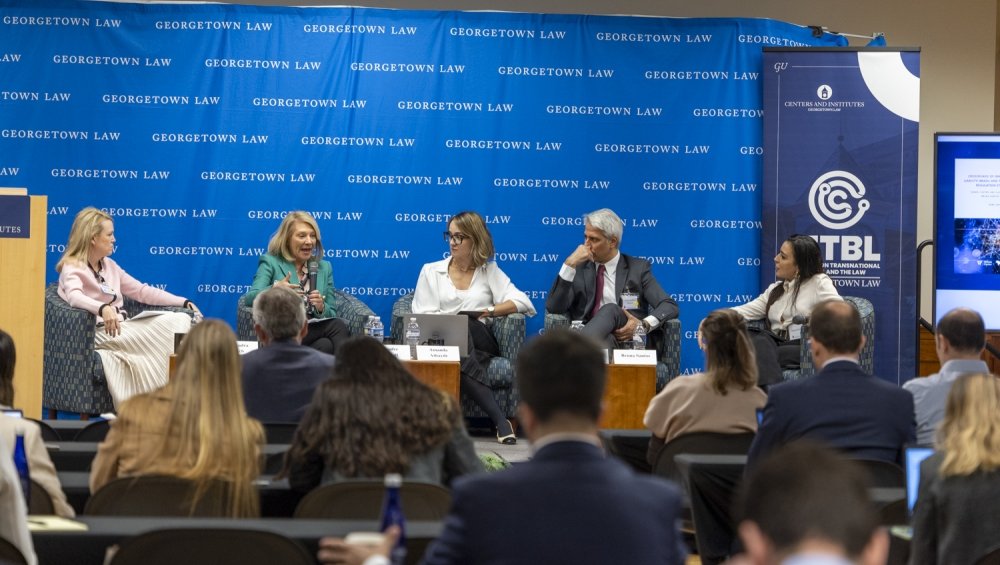Policy and Regulation: Catalysts for Digital Transformation and Progress

On April 9, the Wilson Center, in partnership with the Center for International Business and the Law at Georgetown University, hosted a collaborative panel that examined the strategic policymaking and regulatory frameworks needed to foster digital innovation and growth. As technological advancements continue to reshape industries, aligning policy and regulation with these changes became crucial to promote an environment supportive of innovation, consumer protection, and fair competition. The session featured technology, policy, and regulation experts who engaged in a dynamic discussion, sharing practical strategies, current challenges, and opportunities to harness digital transformation for economic and societal progress.
Balancing Freedom, Privacy, and Innovation
Alexandra Veitch from YouTube highlighted the resounding success of the Marco Civil (Brazilian Civil Rights Framework for the Internet) in balancing the fundamental human values of freedom of expression with the public interest by requiring a court order to remove online content. She noted the maturity of tech regulation in Brazil and emphasized the necessity of building on this solid foundation. From her interactions with Brazilian policymakers, Veitch gathered that while the internet's regulation is crucial, it must be done adeptly to maximize the digital economy's economic benefits.
The Marco Civil in Brazil acts as a constitution for the internet, balancing legitimate rights such as freedom of expression with security and crime prevention. Its impact on Brazil's digital landscape has been significant. Ensuring net neutrality has facilitated the rapid introduction of streaming video services like Netflix, multiplayer gaming, and others in Brazil. Additionally, it supports the entire innovation ecosystem in the country, including digital services and the fight against digital crime. The Marco Civil continues to fulfill this role today, demonstrating its effectiveness in shaping Brazil's digital landscape.
Alessandro Molon, the Marco Civil Bill in Congress rapporteur, was present at the event and highlighted that the law is based on three fundamental pillars: net neutrality, freedom of expression, and privacy and user protection. Remarkably, these pillars have remained intact for over a decade, which is quite unusual in the dynamic technology sector. Molon emphasized the difficulty of crafting legislation that can withstand the test of time in such a rapidly evolving field. He stressed that effective regulation must be smooth and involve collaborative efforts and listening to diverse perspectives, particularly those not immediately apparent when striving to develop sound regulations.
Bruna Santos, Director of the Brazil Institute, points out a critical problem: a significant disparity in the understanding of emerging technologies among users, developers, and regulators. Notably, many responsible for regulating these technologies need a basic understanding of the Internet's infrastructure. This knowledge gap complicates the effective governance and innovation of the digital world, highlighting the need for deeper insights among those shaping its future.
Cloud Power and Policy Evolution in Brazil's Tech Sector
The rapid evolution of cloud technology has significantly impacted Brazil's startup ecosystem, empowering many companies to achieve unicorn status. Jennifer Prescott from Amazon Web Services (AWS) remembered how much the cloud infrastructure has played a pivotal role in this development by providing state-of-the-art, energy-efficient cloud services that are easily accessible. This technology has been instrumental in companies like Nubank and others, dramatically transforming the digital landscape in Brazil. A notable example is Itaú Bank, which utilized AWS to meet the stringent demands of Pix regulations—requiring instant payment services to be operational within just ten months. This case underscores the transformative potential of advanced technologies in Brazil's digital future.
Jennifer Prescott emphasized that we are at a pivotal point regarding policy and regulatory strategies, particularly in AI and generative technologies. She noted that the confluence of increased data availability and enhanced computational power has spurred the development of generative AI, which facilitates the creation of unique and innovative content. "Collaboration between policymakers, regulators, and tech companies is essential to understand these technologies and their potential impacts," Jennifer stated. She also highlighted the regulatory challenges faced in the European Union with the EU AI Act, where the legislative process encountered significant hurdles. As the bill was developing, policymakers were, at the same time, figuring out what some of those provisions meant, to the point that when it reached the European Parliament, the entire system crashed with all the amendments that were being proposed to the bill, underscoring the complexities of formulating policies for rapidly evolving technologies.
Brazil's Tech Regulation and Antitrust Policies
Amanda Athayde emphasized the importance of designing regulation and antitrust policies in Brazil to enhance competition and foster innovation in the tech industry while curbing monopolistic practices that could stifle growth. She outlined several key strategies, including:
- Ensuring legal certainty for investors aiming to improve products and services for Brazilian consumers, thereby encouraging investment and development.
- Avoiding the direct importation of foreign legislation and case law, such as the Brazilian Digital Markets Act (DMA), without adapting it to the local context and considering the unique aspects of the Brazilian market.
- Advocating for regulatory frameworks that promote innovation, such as using regulatory sandboxes and expanding Open Banking, Open Finance, and the Pix payment system in Brazil.
- Engaging with industry stakeholders through mechanisms like public consultations conducted by the Ministry of Finance to gain a deeper understanding of market dynamics.
- Emphasizing the importance of consumer protections, including data security and user safety, and enhancing products without restrictive alternatives.
- Applying remedies focused on improving user experience and fostering innovation rather than concentrating on competitors' profits.
The panel was a significant component of the Doing Business in Brazil Legal Symposium, aimed at addressing the complexities and challenges of conducting business in Brazil. Spanning two days, the symposium included wide-ranging discussions on pivotal topics relevant to Brazil's legal framework, such as tax reform, litigation, arbitration, anti-corruption measures, digital transformation, public-private partnerships, and infrastructure development. Prominent figures, including Ambassador Maria Luiza Ribeiro Viotti delivered keynote speeches. The panels were led by distinguished professionals like Justice Villas Bôas Cueva of the Superior Tribunal of Justice (STJ), Verônica Sánchez, Managing Director of the Brazilian National Water and Sanitation Agency (ANA), and Alexandre Barreto, General Superintendent of the Administrative Council for Economic Defense (CADE).
Policy and Regulation: Catalysts for Digital Transformation and Progress

Crossroads of Innovation and Liability
Crossroads of Innovation and Liability: Brazil and the US’s Digital Regulation Strategies
Learn MoreSpeakers




Introduction

Hosted By

Brazil Institute
The Brazil Institute—the only country-specific policy institution focused on Brazil in Washington—aims to deepen understanding of Brazil’s complex landscape and strengthen relations between Brazilian and US institutions across all sectors. Read more


!["[The book] tries to explain to a foreign reader how the Brazilian consensual model of democracy was built in 1988 after the transition from the military regime" says Oscar Vilhena about his new book, Battle of Powers.](/sites/default/files/styles/gallery/public/media/uploads/images/JARDIM_Luca_CTBL_DBIBLS_Day2_0042%20%281%29.jpg)
!["[The book] tries to explain to a foreign reader how the Brazilian consensual model of democracy was built in 1988 after the transition from the military regime" says Oscar Vilhena about his new book, Battle of Powers.](/sites/default/files/styles/gallery/public/media/uploads/images/JARDIM_Luca_CTBL_DBIBLS_Day2_0046.jpg)
!["[The book] tries to explain to a foreign reader how the Brazilian consensual model of democracy was built in 1988 after the transition from the military regime" says Oscar Vilhena about his new book, Battle of Powers.](/sites/default/files/styles/gallery/public/media/uploads/images/JARDIM_Luca_CTBL_DBIBLS_Day2_0049%20%281%29_1.jpg)





!["[The book] tries to explain to a foreign reader how the Brazilian consensual model of democracy was built in 1988 after the transition from the military regime" says Oscar Vilhena about his new book, Battle of Powers.](/sites/default/files/styles/square_85x85/public/media/uploads/images/JARDIM_Luca_CTBL_DBIBLS_Day2_0042%20%281%29.jpg)
!["[The book] tries to explain to a foreign reader how the Brazilian consensual model of democracy was built in 1988 after the transition from the military regime" says Oscar Vilhena about his new book, Battle of Powers.](/sites/default/files/styles/square_85x85/public/media/uploads/images/JARDIM_Luca_CTBL_DBIBLS_Day2_0046.jpg)
!["[The book] tries to explain to a foreign reader how the Brazilian consensual model of democracy was built in 1988 after the transition from the military regime" says Oscar Vilhena about his new book, Battle of Powers.](/sites/default/files/styles/square_85x85/public/media/uploads/images/JARDIM_Luca_CTBL_DBIBLS_Day2_0049%20%281%29_1.jpg)



